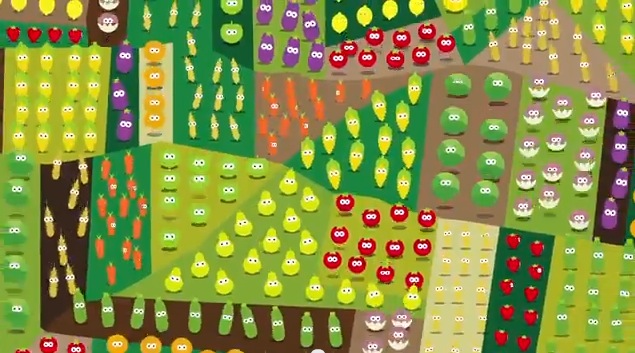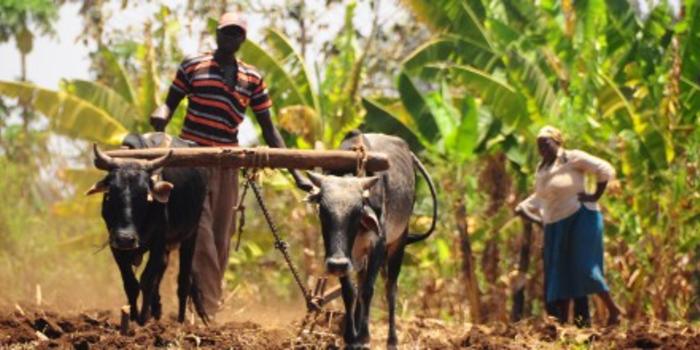Seed Diversity means Food Security! The best way to provide for enough good food across the globe is to let nature do what it was created to do. Seeds and crops adapt to environmental and geographical changes much better than anything man can invent. So let’s respect nature, and let food be food! If you don’t believe me, watch this little graphic cartoon. It’s very convincing.
Tag Archives: seeds
Farmers & people creatively resist GMOs
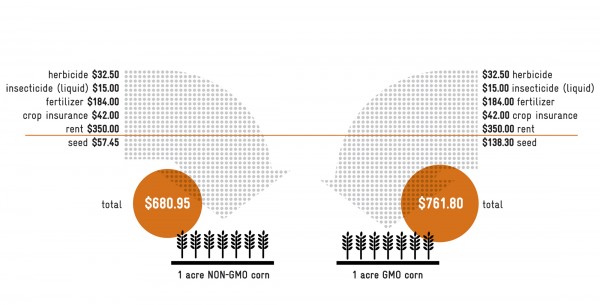 Two of the problems farmers face with GMOs is how much they strengthen weeds and insects, and how much they cost. Over time, the amount of pesticides and herbicides farmers use to kill weeds and insects increases as GMO crops become immune to their effect. Modern Farmer shares these chilling statistics,
Two of the problems farmers face with GMOs is how much they strengthen weeds and insects, and how much they cost. Over time, the amount of pesticides and herbicides farmers use to kill weeds and insects increases as GMO crops become immune to their effect. Modern Farmer shares these chilling statistics,
Between 2001 and 2010, the consumer advocacy group Food & Water Watch reports, total on-farm herbicide use increased 26 percent as weed resistance grew.
Genetically altered seed producers in the United States and the processed food companies that support them have quadrupled their investments in lobbying efforts and public relations campaigns to fool politicians and the public into believing GMO foods are safe and there’s no need to label them. If that’s true, why are these companies so determined that the public not know that GMOs are in all of the common processed foods they eat and all corn products, most soy products and now, even wheat? Monsanto, Pepsi, Coke, Nestlé and other companies are spending tens of millions of dollars to make sure United States residents do not realize how pervasive GMO contamination has become in the US.
This has led some US crop farmers to return to traditional seeds – not because they believe in a GMO free world, but for economic reasons. GMO seeds cause farmers more out of pocket expense to purchase them and increasing amounts of the pesticides and herbicides they use to protect crops. And, GMO contaminated harvests can’t be sold everywhere. Aside from foreign countries that have banned them, some US buyers won’t touch them either. Modern Farmer explains,
Clarkson Grain, which buys conventional and organic corn and soybeans, pays farmers a premium — up to $2 extra per bushel over the base commodity price of soybeans, $1 for corn — to not only grow the crop but also preserve its identity. (That is, keep it separate from genetically modified grain all the way from planting through harvest, storage and transportation.)

And talks about other players in the non-GMO space. The most interesting of which is the Non-GMO Project. It’s ironically funny that since Monsanto & its friends have successfully blocked most legislation to require GMO labeling, this organization emerged to champion the flip side of the issue with recognition for and labeling of, foods that are GMO free. Modern Farmers tells us that for food producers, the benefits of non-GMO verification are many
Sales at Hiland Naturals, which makes conventional and organic feeds for livestock, have more than doubled since it received Non-GMO Project verification last year. Most of Hiland’s customers are small farmers who sell eggs or meat at farmers markets and natural grocery stores. But many sell birds to Whole Foods and to institutions like colleges. Some of Hiland’s growth, owner Dan Masters says, comes from people wanting to know what they’re eating, some is from pending labeling laws and some is from “people who are tired of big corporations and big agriculture.”
Good on us.
Let’s create a definition of Heirloom plants before Big Ag marketers do
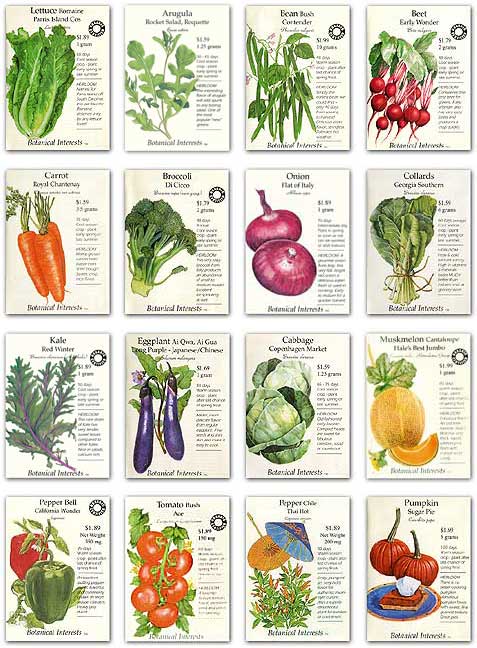 To avoid the term “heirloom” for plants becoming co-opted by marketers or just getting watered down, John Butler of the Heirloom Harvest suggests establishing a clear definition of “heirloom” seeds, plants and cultivars, and policing the term to make sure it remains en pointe. John proposes that although people typically think of heirloom items as old ones, the definition of plants designated as heirloom should be tied not to a timeline, but rather to certain characteristics that remain true of the plant as it moves through generations of cultivation.
To avoid the term “heirloom” for plants becoming co-opted by marketers or just getting watered down, John Butler of the Heirloom Harvest suggests establishing a clear definition of “heirloom” seeds, plants and cultivars, and policing the term to make sure it remains en pointe. John proposes that although people typically think of heirloom items as old ones, the definition of plants designated as heirloom should be tied not to a timeline, but rather to certain characteristics that remain true of the plant as it moves through generations of cultivation.
… we need a clear definition and to identify where use of the term is straying from that definition … what is an heirloom vegetable and how should we use the term correctly?
…when used in the context of vegetables, the literal meaning of an heirloom cultivar would be “a vegetable cultivar of value passed on from one custodian to the next”. Based on this literal meaning, in order to classify as an heirloom variety … the criteria for a cultivar to classify as an heirloom can be expanded and clarified to:
- (Has) some intrinsic value.
- Be open-pollinated or otherwise breed true to type.
- Not be subject to a patent or plant breeders’ rights.
- (Will) have its identity and purity maintained over multiple generations of plants and custodians, through careful growing out and seed saving.
The merit of John’s proposal to a static definition of what Heirloom plants are is brought home by Yolanda Verveen’s post about Heirloom seeds. There’s already much confusion about what this term means.
I haven’t yet looked through The Complete Idiot’s Guide to Heirloom Vegetables. If you have, please let us know what Chris’ definition is.
New Alliance heralds rapid destruction of rural Africa
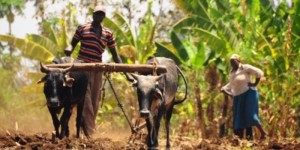 Rural life and natural techniques of agriculture in Africa are in imminent danger of disappearing from this continent forever. Industrialized countries have run out of land and easily exploitable communities in their own countries and are now turning their attention to Africa, where they are teaming up with governments of African countries to seize land from villagers, create mono-culture plantation farms, export massive amounts of food. And to force the use of modified seeds, the free distribution and exchange of native seeds is being outlawed.
Rural life and natural techniques of agriculture in Africa are in imminent danger of disappearing from this continent forever. Industrialized countries have run out of land and easily exploitable communities in their own countries and are now turning their attention to Africa, where they are teaming up with governments of African countries to seize land from villagers, create mono-culture plantation farms, export massive amounts of food. And to force the use of modified seeds, the free distribution and exchange of native seeds is being outlawed.
In plain English, African countries are required to change their trade and agriculture laws to include ending the free distribution of seeds, relax the tax system and national export controls, and open the doors wide for profit repatriation (allowing the money as well as the crops to be exported). In Mozambique, as elsewhere across the continent, local farmers have been evicted from their land under land sales agreements and, according to Guardian newspaper, the country “is now obliged to write new laws promoting what its agreement calls ‘partnerships’ of this kind”
…African nations are required to “change their seed laws, trade laws and land ownership in order to prioritize corporate profits over local food needs”.
…The New Alliance, according to the British prime minister, is “a great combination of promoting good governance and helping Africa to feed its people”. He and the rest of the G8, Friends of the Earth believes, “[pretend] to be tackling hunger and land grabbing in Africa while backing a scheme that will ruin the lives of hundreds of thousands of small farmers”. This new deal is “a pro-corporate assault on African nations”, providing “investment and support” opportunities for greedy investors looking to further expand their corporate assets with the support of participating governments.
…True investment in Africa is investment in the people of Africa: the smallholder farmers, the women and children, and the communities across the continent. It involves working collectively, consulting, encouraging participation and, crucially, sharing – sharing knowledge, experience, technology, land, food, water and minerals equitably among the people of Africa and indeed the wider world.
To date, 9 of 54 African nations have entered into “New Alliance” agreements, including
Ethiopia, where wide ranging human rights violations, including forced displacement and rapes, have reportedly accompanied land sales…
http://www.redressonline.com/2013/06/the-g8s-commercial-colonization-of-africa/
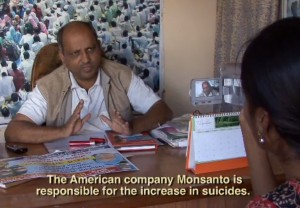 In India, farmers who find themselves embroiled in mounting debt from the use of GMO seeds commit suicide at the rate of one every 30 minutes. How will African farmers react when they discover the ramifications of the seed agreements being forced on them?
In India, farmers who find themselves embroiled in mounting debt from the use of GMO seeds commit suicide at the rate of one every 30 minutes. How will African farmers react when they discover the ramifications of the seed agreements being forced on them?
The only seeds available in India now are GMOs (genetically modified organisms), which require farmers to pay an annual royalty each time they are replanted. The GMOs need additional fertilizers, and as the seasons move forward, more insecticides and pesticides. The soil in which these seeds are planted requires more water. All of which means more and more money for the farmer to lay out.
… Another story weaving in and out of the film is that of a neighboring girl in college who has recently lost her father to suicide, an end claiming lives all over India’s farmlands. She wants to tell his story, along with the stories of all the other suicide victims in the area. Her research and intuition have shown her that at the root of these suicides are GMO seeds.
http://www.huffingtonpost.com/zester-daily/bitter-seeds-film_b_1902221.html
Also see “Lack of conventional seeds enlarges Bt cotton area” and Bitter Seeds (the movie)
Postcards with seeds for planting from the USPS
 I’m always telling people, “You can’t just buy green. You have to consume less.” But gee, there are some fun products out there, like the plantable postcards (they contain seeds) from the USPS. Find the postcards and check out some fun family activities at the USPS Go Green page. They’ve designed a series of 16 Go Green stamps too to encourage ride sharing – buy them and learn about the post office’s commit to sustainability at usps.com.
I’m always telling people, “You can’t just buy green. You have to consume less.” But gee, there are some fun products out there, like the plantable postcards (they contain seeds) from the USPS. Find the postcards and check out some fun family activities at the USPS Go Green page. They’ve designed a series of 16 Go Green stamps too to encourage ride sharing – buy them and learn about the post office’s commit to sustainability at usps.com.
